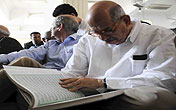jj September 15th, 2010
From The Australian
BURMA is a dangerous place for the media. Foreign journalists are routinely refused entry.
Local journalists are heavily censored, underground journalists are hunted down, arrested and jailed for years.
Paranoid and xenophobic, the ruling military junta is ever vigilant to quash criticism, especially now, with an election due.
An election set for November, the first in 20 years, has been widely derided as a farce and a military publicity exercise that will do little to change the nature of the repressive regime.
Nevertheless, optimists think the exercise might open a little space for incremental change.
So journalists, inside and outside the barricaded nation, have been monitoring developments with great interest.
As the Thailand bureau chief of the non-profit Democratic Voice of Burma news network, Toe Zaw Latt helps oversee 100 staff working illicitly in Burma, as well as more than 38 in Thailand.
An Australian citizen with a degree from Monash University, Toe Zaw Latt is sure the ruling State Peace and Development Council will try to further restrict news from Burma as the elections get nearer.
He is working on ways to foil the generals’ plans and get news out to the world. However rigged it is, the election might bring some surprises, and however they pan out, they are important news.
“Sure, it’s getting more dangerous,” he says, in the DVB headquarters in Thailand’s northern city of Chiang Mai.
“Everything is planned, everything is controlled. They will shut down the internet — they did it for the Saffron uprising (by the monks in 2007), the referendum, the visit of (UN Secretary-General) Ban Ki Moon.
“But we are already prepared for this. We have to use the latest technology, we have to open many ways to overcome this deadlock.”
The junta has established a Russian-trained police cyber-crime unit, he says, to track down undercover and citizen journalists trying to send information out of Burma via the internet.
Toe Zaw Latt is reluctant to spell out details of the various ways of getting round the expected clampdown, but it’s likely they include satellite phones, clandestine internet tricks, and straightforward smuggling of footage over the border to Thailand. DVB has stringers all over Burma, including conflict zones.
“If anything happens we know, we know,” he says.
The news network broadcasts television and radio into Burma in various languages, to an estimated audience of 10 million, and also runs a website (www.dvb.no).
Cut off from the world and real news by heavy restriction of the internet and rigorous censorship of newspapers, Burmese mostly rely on external broadcasts from DVB, the BBC World Service, VOA, and Radio Free Asia.
Toe Zaw Latt says the media in Burma are “largely ineffective”.
Weekly titles such as the Myanmar Times, owned by Australian Ross Dunkley, are heavily censored, he says, and they cannot be relied on.
“They repeat propaganda,” he says. “They have to, it’s compulsory.” So far, he says, the junta has not permitted publication of a privately owned daily newspaper.
DVB journalists are often leaked information by well-wishers from all strata of the junta.
“Not every soldier, not even all the high-ranking ones, is happy with what is going on,” he says.
“They are happy to leak information to us.”
He notes with some pride that DVB first aired the news that the junta wanted to develop nuclear weapons.
This stream of leaks may dry up as the election gets closer, and leaking becomes more dangerous. Still, the smiling bureau chief says, DVB will not miss anything.
Junta officers cannot be directly questioned, but DVB always gets its hands on information from tightly controlled press conferences.
This simmering military dissatisfaction, Toe Zaw Latt says, is the impetus behind the elections.
The ruling military junta, the State Peace and Development Council, has been impervious to Western sanctions and uninterested in Western criticism.
Civil protest, such as the Saffron uprising, left the generals unmoved. So why even bother to stage elections?
Toe Zaw Latt says that’s the million-dollar question, and it has a very local answer. Many in the military were becoming restless, and asking what had happened to the back-to-barracks plan, and the “roadmap to democracy” mooted years ago.
Toe Zaw Latt was exiled from Burma in 1988, when a popular uprising challenged the junta and thousands were killed.
He won’t say how many of the 100 Burmese working for DVB in Burma are journalists and how many are support staff, as he wants to keep the junta in the dark as much as possible.
Nor will he say how many DVB journalists have been jailed, but it’s at least six, including one young woman who was sentenced to 27 years earlier this year for interviewing monks.
DVB journalists almost never carry cameras openly, and hidden cameras are used.
Some of the tricks were seen on Burma VJ, a documentary about DVB journalists that was in the running for an Academy Award earlier this year.
Junta paranoia extends to anyone seen with a video camera.
Video repair shop staff avoid taking cameras anywhere, in case they are caught in a sweep.
Video cameras are generally owned only by the rich, so any subversive journalist caught with a camera is in deep trouble.
Regardless of international scepticism about the election, Toe Zaw Latt thinks that it could open some space for civilian discourse.





